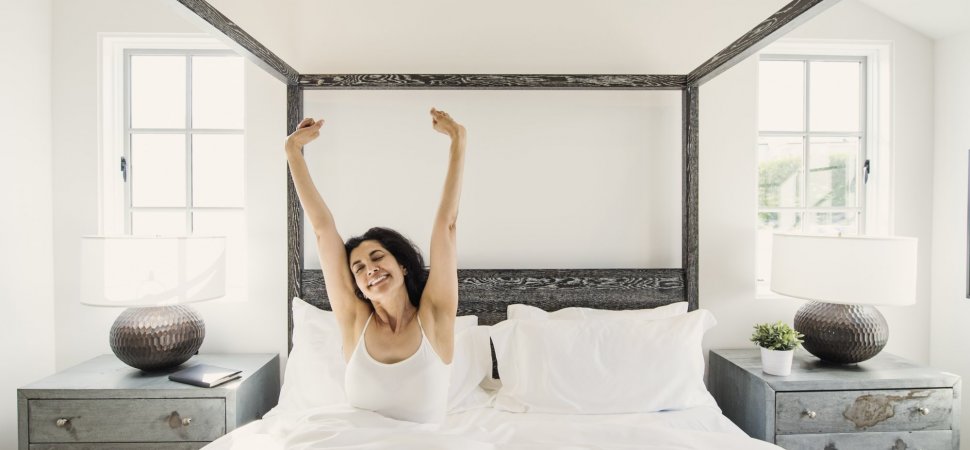I tested the Tempur-pedic Tempur-LuxeBreeze to see if it helped boost my productivity

The phrase “having a sleepless night” is more troubling than you might think.
As busy professionals, we strive to stay connected all day, answer emails quickly, and offer helpful insights at meetings. In other words, we like to be on our game at all times.
Yet, if you are not sleeping well at night, there’s a lot of neurological research that suggests you can’t function at an optimal level. In fact, you can barely function at all.
I’ve had my own sleep issues over the years. Part of it is stress-related, I’m sure. Whether it be on business trips or at home in my own bed, I sometimes ruminate too much on the events of the day, playing what-if scenarios and mulling over conflicts that occurred at work.
Recently, I set out to test the theory that sleep really is a major factor in my own productivity. I used a smart bed that came in for another article recently and decided to closely track my sleep and work production over a few weeks.
The Tempur-pedic Tempur-LuxeBreeze costs $4,499 for a queen-sized mattress. I also tested the Tempur-Ergo Extend Smart Base, which costs $2,199. I’ll let you decide if the costs are worth it after explaining how the bed helped me sleep and get more work done.
I wasn’t expecting this, but my favorite feature had to do with the analytics. An app called Sleeptracker (which I tested on an Android phone) provides a report about how you slept the night before and also some tips on what to do differently. Initially, I thought–great, an app can tell me when I sleep poorly. I ended up liking the reports because they were proactive. They let me know when I was getting more deep sleep and what time I went to bed, and suggested going to bed at the same time each night.
It worked. Each night, the app informed me about a slight increase in deep sleep, say about 5% more. It would let me know my total hours of deep sleep as well, and I noticed it impacted my work. With better sleep, I dove into my emails and completed more tasks by lunch. I felt more rested and even had longer and more vivid dreams.
The bed also has a few extra AI-related perks. This feature didn’t always work for me, mostly because I have a deviated septum and I snore quite vigorously, but the Tempur-LuxeBreeze can sense when I’m snoring and automatically raise the head of the bed. During the test period, I would sometimes turn over or breathe easier because of the elevation change. My wife joked that she didn’t have to “encourage” me to roll over.
The mattress itself uses an interesting cooling technology thanks to the materials. I wasn’t sure what to think at first because I tend to prefer a warm bed. Again, from a scientific standpoint, it turns out we sleep better when we’re a bit cooler. It was interesting how I felt more cocooned into the mattress (cool at first, then warm) and didn’t wake up as much.
I was mostly aware of how this made me work more efficiently during the day. Waking up in the morning, I was more eager to get started on my projects. Previously, I was missing out on that deep sleep at night and my brain wasn’t going into a restful state. I ended up viewing the entire test as game-changing for me, even if I did have questions about the total cost. I’ve tested many other beds over the years, including a few that arrived in a box, but I’ve never been able to track my sleep in quite the same way.
There’s a daily sleep score, and the app provides rich data about trends, such as whether you’ve been falling asleep earlier over the last week.
I wasn’t as intrigued by some of the other features. There’s a massage mode that I probably wouldn’t use (it operates at three different levels of intensity). You can click an option in the app to turn on a night-light under the bed, but I prefer the Sleep Number option that turns this on automatically using a motion sensor. And, I like how the Eight Sleep Pod lets you control the temperature of the bed, which is nice for people who prefer sleeping in warmer or colder conditions.
What impressed me about the Tempur-LuxeBreeze, in the end, were the intelligent features. The snore detection actually worked, and the AI monitoring provided just the right amount of feedback. It didn’t seem like the app was scolding me as much as offering helpful tips based on real data.
I’m not always blown away by emerging technology. It can seem like a lot of hubbub over something that is meant to provide a soft place to sleep.
For me, there were actual traceable benefits and an increase in work output. I’m finding the sleepful nights really helped give me a boost during the day.